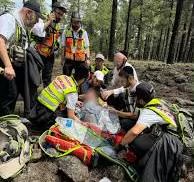Two Wednesdays ago on August 21, somehow an 8-year-old boy was lost. He
was on vacation with his family standing right ousted the Lava River caves near
Flagstaff Arizona. And somehow, he disappeared. His parents called out his name. But
he was nowhere to be found. And as we can only begin to imagine, panic set in. Word
went out and people started to raven. And while often there is good news, sometimes
there is not and a sickening feeling began to set in. A pit developed in the collective
stomach of the Klal Yisrael. The sunset and night fell upon the park. It started to rain. It
was 57 degrees. Put yourself for a moment in little Tzion Meron’s shoes. You’re 8 years
old and you start to hear the sounds of the night. The scary sounds of darkness. You
have lost your parents. Your wet. You are completely lost.
This story got me thinking about what it means to be lost. To be Tzion Meron
disoriented, fatigued, bewildered and scared all alone in the middle of the night. Close
your eyes and imagine that for a moment.
This week’s parsha contains within it the famous mitzvah of the Arei Miiklat or
the Cities of Refuge. The Torah says “Tachin Lecha HaDerech” You need to make signs
and clear directions so the cities of refuge can be easily found. This is a mitzvah. To
clearly demarcate the path to the cities of refuge. Why? Moreover, there is a very
fascinating passuk that introduces the mitzvah of the cities of refuge. The Torah
says:
The Torah commands this mitzvah only after the Jewish People settled the Land of
Israel. Only after they were conformable and being successful. At that point there is a
mitzvah to have these cities of refuge. Were there not accidental murders before that?
What did they do all the years they were in the desert or during the conquest of the
Land?
I believe the Torah is teaching us an important lesson. Sometimes the most
bewildering moments are when everything is going well- and then something happens.
In those moments you panic and don’t know what to do. During the years of war or
wondering the desert, if someone killed someone by accident they were used to
dealing with adversity. SO they would figure out a place to hide. However once
everyone was settled- if someone killed by accident- they would panic? What do I do?
where to I go? What next for me in my life? This is why the Torah says “tachin Lecha
HaDerech” to demarcate the path clearly. Because in a moment of turmoil, in a
moment of bewilderment- panic can set in. We don’t know what comes next. In a very
profound sense if someone is in content turmoil its easier to deal with adversity than
someone who is unaccustomed to dealing with it.
I would say for many Jews this has been the story of this year. None of us saw
October 7th coming. None of us saw the terrible anti-Semitism in this country coming.
We are unaccustomed to this level of tragedy. Most of us have had beautiful, peaceful,
successful lives- coming to grips with such a tragedy. Coming to grips with the terrible
murders of hostages like we saw this week- is incomprehensible! Wrapping our minds
around the evil, pathological terror of Hamas boggles the mind.
This week we entered the month of Elul. According to Jewish Tradition there are
many acronyms associated with the month of Elul but one of them is Inna LYado
V’Samti Lecha- a reference to the cities of refuge. That Elul in a very real sense is a city
of refuge. A month of refuge. And I would say this is more relevant this year than ever
before. We have had a terribly bewildering and disorienting year. But the purpose of
Elul is to create a refuge. A space. A time that we can recenter ourselves. We can find
our way back. We can try to reorient ourselves towards what it means to be a Jew.
What are future is. Where are we going.
This is why, it is especially important during this very difficult year, to refocus
ourselves, to recenter our selves to reprioritize ourselves during this month. We should
focus on our daily learning a bit more. Focus on getting in touch with our Judaism
more. The Shul has recently launched an incredible daily and nightly learning program &
lectures for you to take advantage of. For davening, this is an area we collectively still
need too strive for more on. We need to be more focused on the davening, have more
concentration during Shmone Esre, have fewer distractions and conversation- so we
can truly refocus ourselves during this holy month of refuge.
It is through doing these things that Elul can provide the cocoon and solace it is
designed to do. Here is the end of the story of Tzion Meron. Baruch HAShem The
incredible heroes of Klal Yisrael dropped everything they were doing and flew across
the country to look for a lost boy. Someone donated a plane. Hatzalah, Air Hatzala,
Chaverim groups flew from across the country to fin little Tzion in the vast Lava River
Caves. Hatzolah Air, had had their 14-seat jet ready to fly by 3 a.m. The flight was
given priority air traffic, was there in 3 hours and 50 minutes. By 9 a.m. the following
day, the Chaverim volunteers had started their search of the national park. Chaverim
used drones and a grid search. They would all walk together, calling out, “Tzion,
Mommy’s looking for you!” and “Tzion, Daddy’s looking for you!” Then they would stay
quiet for several seconds to wait for a response. After calling out and listening, they
heard a weak voice. It was Tzion. It was Aug. 22, before noon. The boy had been found
less than a half mile from the cave’s entrance. He was pale, wet and cold, Margaretten
said, and when he saw the responders, “he asked for his daddy.”
My friends, this is THE metaphor for Elul. We are lost. We are confused. But with
a weak voice we call out for our daddy- and in Elul he finds us. Let us do our best to
ensure that is Elul is in fact the refuge it was intended to be.

